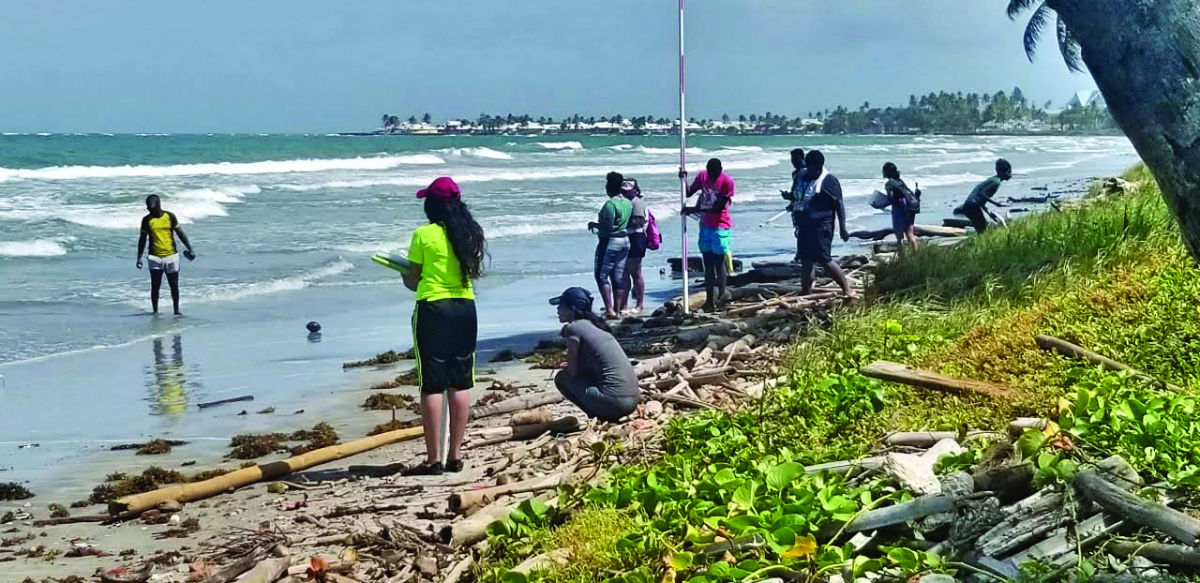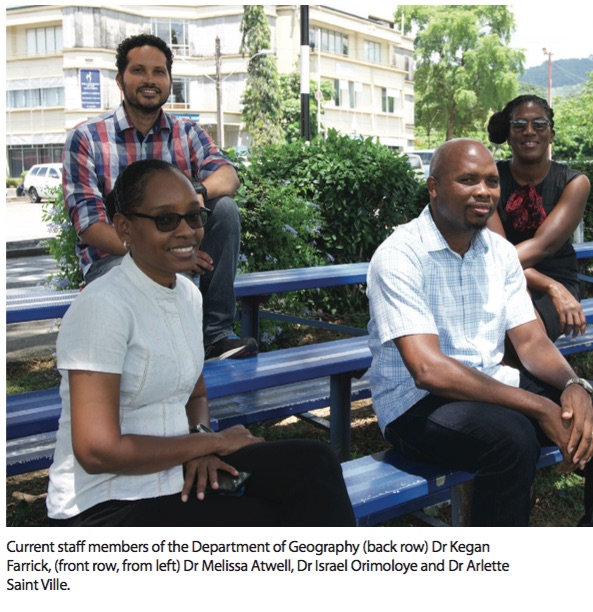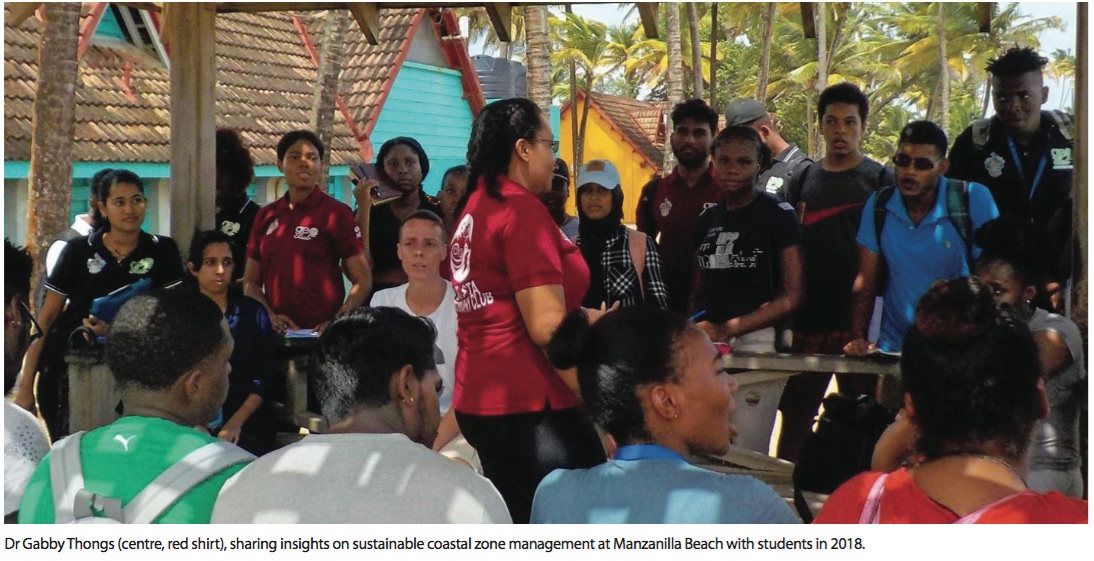Celebrating its 10th year, UWI St Augustine’s Geography Department adapts to changing times

Students of the UWI St. Augustine Department of Geography participate in a coastal surveying exercise during the Department's 2019 Residential Field School in Tobago.
“For the past ten years, St Augustine’s Department of Geography has produced graduates with specialisations in areas including – but not limited to – risk management, geographic information systems (GIS), climate change, social justice, hydrology, meteorology, and policy development.
This cadre of graduates have gone on to do further research in these fields and work with local, regional, and international organisations that are tasked with sustainably managing livelihoods and natural resources.
But in 2013, the unit was restructured into a department with a renewed mandate of producing world class geographers.

In commemoration of its tenth anniversary this year, UWI Today spoke with the Department’s Dr Junior Darsan, Dr Melissa Atwell, Dr Kegan Farrick, Dr Gabby Thongs, and current Head of Department (HOD) Dr Arlette Saint Ville.
With the ever-changing characteristics of the region’s natural hazards, socio-environmental issues, socio-economic issues and natural resource use challenges, each academic reflected on how the Department has strategically adapted to changing times over its ten-year history.
In transitioning to a department in 2013, Dr Darsan said many aspects of the unit had to evolve to meet its new mandate, which is focused on adapting to changing times and prioritising global issues like climate change and sustainability.
Joining the former unit in 2012, Dr Darsan is the Department’s longest serving staff member, geomorphologist, and a senior lecturer of several physical Geography courses.
He recalled, “When I came on, I was tasked with the responsibility of further building upon the existing physical Geography courses – to match what was being done at the Mona Campus – for the new department.
The idea then was to enable mobility for students across both campuses. Today, cross campus teaching is a reality at The UWI.
“Geography is one of those disciplines that is fundamental globally, so there are no questions about the merits of having a full-fledged department and not a unit.”
Proud of the department’s growth and expansion of programme offerings over the years, Dr Darsan attributes its success to the camaraderie among academic staff and the shared vision for its future.
A lecturer in several physical geography and environmental courses since 2016, Dr Farrick is a hydrologist, and also served as HOD from 2019 to 2022.

Tasked with navigating the department through the COVID-19 pandemic, he told UWI Today that its academic staff leaned on their critical thinking and problem-solving skills as geographers to forge a way forward.
Where possible, hybrid approaches to learning were adopted and maintained.
Final exams were also discontinued for some courses, making them 100 percent coursework.
He explained, “We have substituted final exams for more critical based and problem-solving types of exercises where things are a lot more scenario focused.
“Instead of memory learning, we are really trying to get students to tackle different problems in our classes with this approach.”
While reliance on virtual learning has increased since the onset of the pandemic, there are aspects of studying geography which require real-world immersion through field work and face-to-face discussions.
Dr Farrick said the department’s annual field course in Tobago is central to achieving this.
For one week, students are exposed to a range of different field skills while undertaking research in Tobago.
The first student of the Department to graduate with an MPhil and PhD, Dr Atwell has also been part of its technical staff since 2008 and currently serves as Head Technician.
Over the years, Atwell said there have been advancements in the Department’s equipment to keep up with changing research technologies.
In earlier years, for example, basic surveying equipment like clinometers and compasses were used in fieldwork to get land measurements. Recently however, the Department obtained a high-tech drone that has the ability to obtain georeferenced images, and has made fieldwork more efficient.
She explained, “We make every effort possible to stay current and up-to-date with the latest equipment.
“We think it's important to invest in up-to-date equipment, and expose our students to cutting edge technology.
“Before, we used conventional techniques to determine soil properties. Now, we have geophysical techniques such as electromagnetic induction that offer the possibility of collecting spatially dense measurements of soil properties.”
Throughout her six years at the Department, Dr Thongs has taught a mix of eight different human and physical geography courses.

She is leading a number of regional projects with a strong emphasis on disaster resilience. Most notable is a collaborative project between The UWI and the Caribbean Disaster Emergency Management Agency (CDEMA), which aims to develop a comprehensive community-based disaster risk reduction tool in several Caribbean countries.
Department graduates - living in some of the islands where these projects are ongoing - have been able to contribute to different roles.
Thongs said this is one example of the value of geography students in a region that continues to face increasing vulnerabilities to natural hazards because of climate change.
“In studying Geography, there is the opportunity to utilise a diverse blend of skills.
“It’s not just about imparting the knowledge (through lecturing), but also getting to do on-the-ground research that directly improves disaster resilience in the Caribbean.
“I feel a lot of pride when I go to other islands and see former students involved in these projects.”
Where needed, Thongs said the department is constantly revising the curriculum of courses to be up-to-date with changing technology and information.
But, recognising that there may be entire areas where there are grounds for new research, they continue to add new programmes, like the recently created minor in GIS and Sustainability.

“There are students who have a love for GIS, and to mix this love with Geography in a way which deals with other subject matters – like land use changes and climate change – gives them greater certification for this skill and added value to the employer.
“It is our hope to continue empowering the upcoming generations with the skills needed to actually be problem solvers and game changers.”
Given the dynamism of studying Geography with the different human and physical components, Thongs added that it is possible for graduates to enter the working world as multi-hyphenates that can easily fit into any role in the expanding environmental field.
Starting her journey at the department in January 2020 as a Human Geography lecturer, Dr Saint Ville has also been HOD since August 2022.
She told UWI Today that her focus is to continue elevating the department’s visibility and relevance by increasing stakeholder engagement using a multipronged approach, which includes collaborating with a range of environmental stakeholders, increasing opportunities for internships, and improving the department’s social media presence.
“Another area I am very keen to work on is our connection to the UWI Mona Campus’s cadre of geographers who are also doing great work. There is a desire to give students a chance to consider doing one of their courses at Mona and vice versa for students at Mona.
“With this, we can stimulate cross fertilisation of ideas.”
Leaning on the Department’s existing “Brown Bag” lecture series, Dr Saint Ville said it is an opportunity for renowned global geographers to continue visiting the department to share their experiences and knowledge, engage in discussions about solutions, and learn more about the department.
Strategically, the department’s offerings are also being highlighted based on the UN Sustainable Development Goals, and there are new programmes in the works like an MSc in Environmental Resilience and Sustainability.
Follow the Geography Department on Instagram @uwistageography to keep up to date with all its events and research.